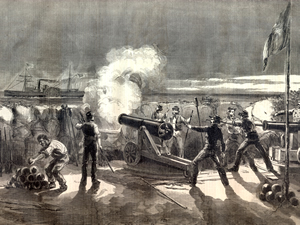I have an opinion article up today at CNN.com, co-authored with Katrina Browne, on the occasion of the 150th anniversary of the outbreak of the U.S. Civil War at Fort Sumter.
The subject is the mythology about the war that still lingers on both sides. For the South, that mythology has received ample attention over the years; it’s the myth of the “Lost Cause,” which centers on a romantic vision of the rebellion which excludes slavery as the primary motivation for southern secession.
For the North and the rest of the country, myths about the Civil War, and particularly about the role that slavery and race played in the conflict, remain less well explored and are therefore worth examing.
Here is how the article begins:
This week marks the 150th anniversary of the outbreak of the U.S. Civil War, a war that redefined national and regional identities and became an enduring tale of noble resistance in the South and, for the rest of the country, a mighty moral struggle to erase the stain of slavery.
On April 12, 1861, Confederate forces opened fire on the beleaguered Union garrison at Fort Sumter, South Carolina. By April 14, the fort had fallen and the war had begun in earnest.
By the time Fort Sumter was again in Union hands, following the evacuation of Charleston in the closing days of the war in 1865, the war had become the bloodiest in the nation’s history — and has not been surpassed. Yet the relationship of the North to the South, and to slavery before and during the war is not at all what we remember today.
The reality is that both North and South were profoundly complicit in slavery and deeply reluctant to abolish our nation’s “peculiar institution.”
To read the rest of the article, go to “Civil War’s dirty secret about slavery” at CNN.com.
 “Civil War 150th” is a periodic compilation of information related to the sesquicentennial, or 150th anniversary, of the U.S. Civil War (2011-2015). In keeping with the theme of this blog, the focus is on the often-misunderstood role of slavery and race in the war.
“Civil War 150th” is a periodic compilation of information related to the sesquicentennial, or 150th anniversary, of the U.S. Civil War (2011-2015). In keeping with the theme of this blog, the focus is on the often-misunderstood role of slavery and race in the war. Today is the 150th anniversary of the outbreak of the U.S. Civil War.
Today is the 150th anniversary of the outbreak of the U.S. Civil War.